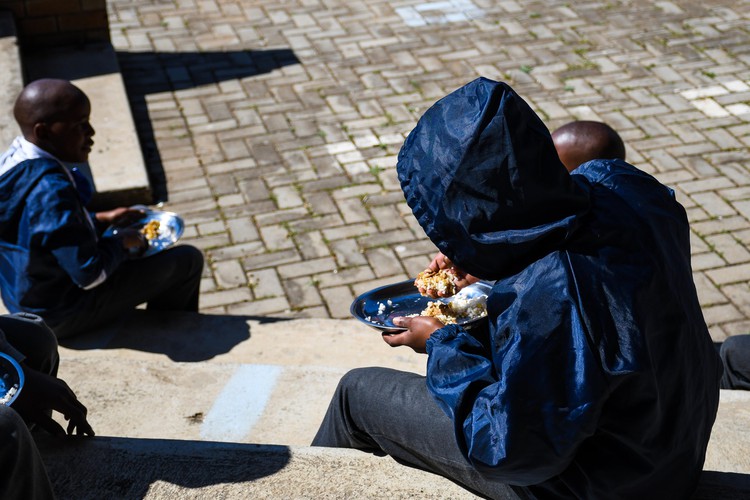
28 May 2021
Cosmo City Junior Primary School serves about 750 learners a warm meal every day they are at school. Photo: Julia Evans
Schools have been urged to provide food parcels to learners who are unable to get to school on the days they are not being taught. The Covid-19 shift system in schools has meant many learners who rely on school nutrition are missing what may be their only meal of the day.
Millions of learners across the country rely on the National School Nutrition Programme (NSNP) for their main or only meal of the day. In terms of a court order in July 2020, schools are obliged to provide meals for qualifying learners even on the days they are not being taught. But some learners are not able to come to school on those days.
Cosmo City Junior Primary School has over 2,100 learners, who come on alternate days to comply with Covid-19 regulations. Deputy principal Mamodisa Mofokeng said that the school gives learners the option to collect their allocated hot meal on days they don’t attend school, but only about ten learners do so.
“Those who are struggling at home are welcome to come at any time,” Mofokeng said.
Mofokeng said many children who bring a packed lunch still choose to have the school meal because “it looks better than what they have in their lunchbox”.
“The food is enough to sustain the learners. In the past it used to be bread, jam, peanut butter. Now it’s a nutritious, balanced meal.”
Staff at Cosmo City Junior Primary School prepare a meal for learners. Photo: Julia Evans
At Reshomile Primary School in Diepsloot Township, the learners are divided into two groups and also attend school on alternate days.
Nutrition programme coordinator for Reshomile Primary, Rangwato Sape, said about 300 of the 650 students come to the school on their day off, to collect their hot meal.
This is in line with what the most recent National Income Dynamics Study – Coronavirus Rapid Mobile Survey (NIDS-CRAM) Changes in Education report indicated. The survey, released 12 May, reported that 45% of adults living with children indicated that their household had run out of money for food.
The menu is prescribed by the Gauteng education department and includes instant maize meal for breakfast and a protein, and starch with a vegetable or fruit for the main meal. For example, on Tuesdays schools are recommended to serve pilchard stew with rice and a green vegetable in season. On other days, the school serves sugar bean stew with samp and a yellow vegetable in season or milk with maize pap and a fruit.
The government buys all the ingredients and pays a stipend to the staff who cook the food.
Gauteng Department of Education spokesperson Steve Mabona said there are 1,640 schools on the programme in the province. The budget for the 2020/21 financial year was over R1.3 billion.
But Julia Chaskalson, communications officer at SECTION27, told Ground Up: “The National School Nutrition Programme (NSNP) has never reached its full capacity of over 9.6 million learners in the country since South Africa went into lockdown. The numbers vary month on month, but recently we’ve seen that more than 1.5 million learners are not receiving the school meals they are entitled to.”
Sape said that Reshomile Primary offers a bus for students who live further away, which they can use to travel to school on their day off to collect their hot meals.
But that is not the case with all schools. “Many areas do not offer scholar transport to learners on the days that they are not required at school,” said Chaskalson, “This is a continued barrier to learners’ accessing the school meals that they need.”
Chaskalson said a solution is for schools to provide parcels of food which can be prepared at home, such as maize, dried beans, milk etc.
Mabona said that schools were encouraged to prepare food parcels for learners that would last them a week for the days that are not at school or during school holidays.
However, Chaskalson said, “Many provinces claim they don’t have enough money to do this, because for hot meals at school they buy in bulk and use economies of scale to keep prices of meals down, and they claim they cannot do the same for parcels of food.”
“Education authorities have repeatedly stated lack of funds, and without motivating for additional financial support from elsewhere in government. But because of insufficient funds, not all provinces offer food parcels or hot meals for learners on the days that they are off.”
“There is a need to give out more food parcels to all qualifying learners, across all districts, so that learners are going home with food for the days that they are not expected at school.”
“The government needs to invest properly in the nutrition programme so that provinces have enough budget to provide food parcels or vouchers for learners on the days that they are at home, which some provinces have done with success.”
At Reshomile Primary, Sape said learners get a food parcel at the end of the month made up of surplus food left over in the storeroom from the hot meals once the school gets a new delivery of food from the government. But, Sape said, many of the families don’t have electricity or paraffin and cannot cook the ingredients they receive from the food parcel, so the hot meal the students get is very important.
“We need more money,” Sape said.
 Many learners are missing out on school meals on the days they do not come to school because of the Covid-19 shift system. Photo: Julia Evans
Many learners are missing out on school meals on the days they do not come to school because of the Covid-19 shift system. Photo: Julia Evans